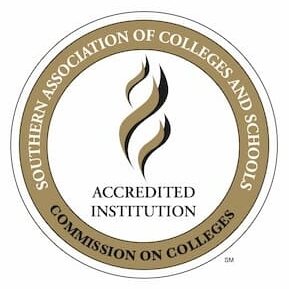The Office of Accreditation and Quality Assurance exists to help LETU fulfill its mission through maintaining compliance with accreditation standards and assisting in developing innovative assessment practices leading to continuous improvement throughout the institution.
- Accreditation
- Quality Assurance
- Institutional Effectiveness
- Institutional Research
PURPOSE OF ACCREDITATION
Accreditation is the recognition of a voluntary quality assurance process, through which colleges and universities strive to deliver a quality product (degree) and continue to grow and improve over time. Every few years, an institution must provide evidence of their continued efforts in these areas to have their accreditation reaffirmed.
 LeTourneau University has been accredited by the Southern Association of Colleges and Schools Commission on Colleges (SACSCOC) since 1970. The Commission is led by a governing board comprising presidents, faculty, administrators and staff of the colleges and universities within the Commission's 11-state region. As an accredited institution, LeTourneau University is a full voting member of SACSCOC and has a voice equal to that of even the largest universities.
LeTourneau University has been accredited by the Southern Association of Colleges and Schools Commission on Colleges (SACSCOC) since 1970. The Commission is led by a governing board comprising presidents, faculty, administrators and staff of the colleges and universities within the Commission's 11-state region. As an accredited institution, LeTourneau University is a full voting member of SACSCOC and has a voice equal to that of even the largest universities.
Our accreditation by SACSCOC signifies three things:
- LETU has a mission appropriate to higher education.
- LETU has the resources, programs and services sufficient to accomplish and sustain that mission.
- LETU maintains specified educational objectives that are consistent with its mission and appropriate to the degrees it offers.
Closely aligned to these three signifiers is SACSCOC's expectation that accredited institutions dedicate themselves to the continuous improvement of their programs and services to ensure the highest quality educational experience possible.
From a student's perspective there are three primary benefits to accreditation:
- It confirms that LeTourneau University is committed to providing a quality education.
- It affords credibility to the LeTourneau degree in the eyes of graduate schools and employers.
- It helps qualify students to apply for a variety of outside financial aid options (government agencies, private foundations, employers, etc.).
Collaborative in nature and focused on continuous improvement efforts, the department of Quality Assurance provides a variety of research, planning, assessment and related support services to the university community.
By integrating external data reporting requirements with internal decision support activities, QA has increased the value of university data for both activities. The department's use and presentation of data helps extend the data into useful and relevant information.
This integrative approach is reinforced by QA staff's involvement in major LETU operational processes, including budgeting and program assessment.
MISSION
The Quality Assurance (QA) department serves the LeTourneau University community by effectively
- Ensuring the accuracy of vital university statistics and the dissemination of these data to a broad spectrum of internal and external information consumers, including regulatory agencies, consortia and publishers.
- Collecting, analyzing and disseminating data and other information in support of operation management and decision-making, which includes analyzing and assessing decision-making at the university on an on-going basis.
- Supporting the tactical and strategic planning processes at the university.
ROLES INCLUDE SERVING AS
- The university's clearinghouse for external reports
- The official institutional source for data and analytical information about the university
- The principal source for data and other information that supports institutional planning, policy formation, decision-making and communication
- The data archival location for planning documents and other materials relevant to the university's tactical and long-range planning processes
- The timely producer of official university data and reports, including, but not limited to:
- Enrollment statistics
- Persistence and graduation rate studies
- Program assessment
- End of course (EOC) evaluations
- Academic advisor evaluations
- Integrated Postsecondary Education Data System (IPEDS) surveys
- Common Data Set (CDS)
- Independent Colleges and Universities of Texas (ICUT)
- Peterson's
- U.S. News and World Report
PREPARED PUBLIC DATA
The purpose of institutional effectiveness is to evaluate how well students and programs are meeting their goals and outcomes. The ultimate goal is ensure a quality learning experience and to bring harmony and a sense of well-being to the lives of students, faculty members, staff and the institution.
The assessment process lays the foundation for institutional effectiveness. The assessment process allows us to evaluate the goals and outcomes of departments and programs in order to make changes that move LeTourneau University forward in meeting its mission, goals and strategic plan.
ASSESSMENT CYCLE
Maintaining institutional effectiveness requires a process for evaluating how well outcomes and goals are met within programs. This process involves a continuous cycle of goal-setting, data collection and analysis, and creation and implementation of improvement plans:
- Establish Outcomes and Goals
- Create or Identify the Measurement Tool
- Create Data Collection Process
- Establish Target Level of Performance
- Collect Data
- Analyze Data
- Create Modification to Improve Performance
- Implement the Action Plan
This cyclical process is foundational to a culture of continuous improvement.
Reporting takes place through Weave accreditation management software. Institutional effectiveness reports documenting the implementation of action plans are due September 1 for the previous academic year.
For additional information, contact Dr. Karl Payton.
The Office of Institutional Research serves the LeTourneau University community by providing higher order research and timely, accurate data to support informed decision-making and campus assessment efforts in order to enhance institutional effectiveness and advance the core mission of the university.